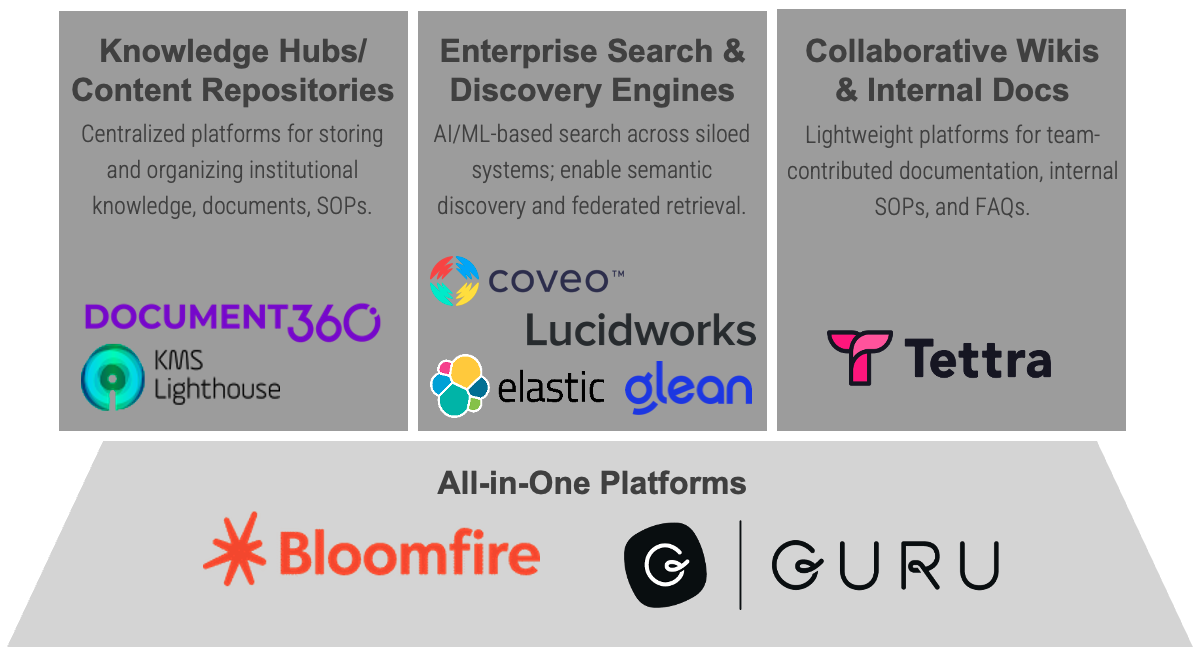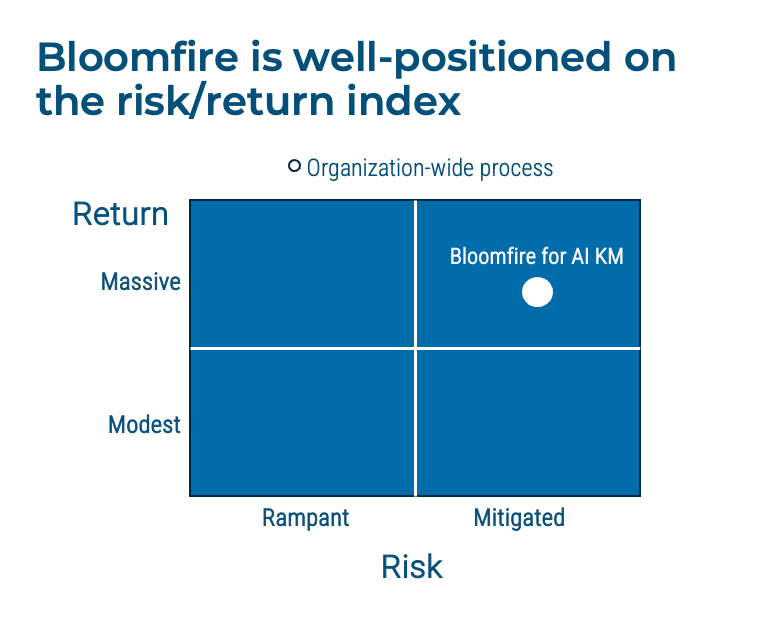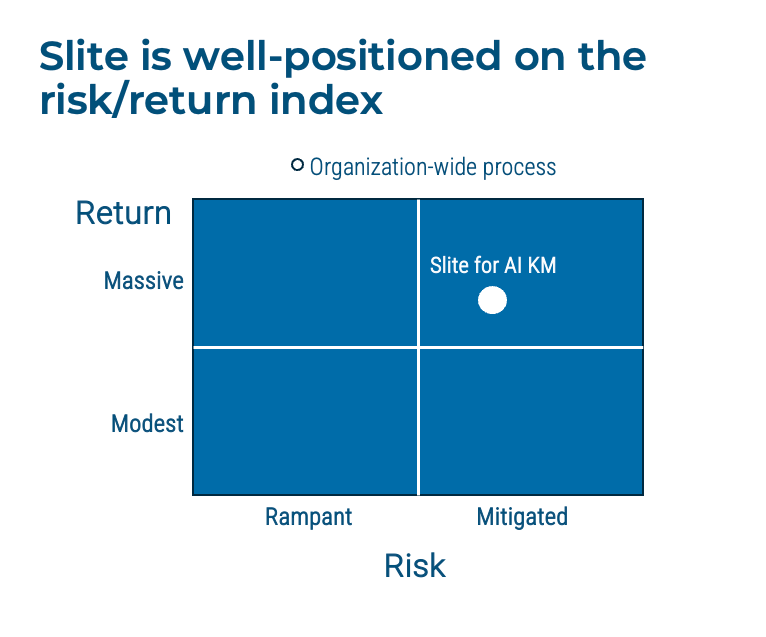- IT leaders and knowledge managers are currently overwhelmed by the sheer volume of internal information distributed across systems such as SharePoint, Slack, Google Drive, and Confluence.
- Employees frequently spend excessive time searching for documents, conversations, or expert knowledge, hurting productivity and decision-making.
- Hybrid and remote work have intensified these challenges, making it harder to retain and access institutional knowledge.
- As a result, many businesses are turning to AI-powered knowledge management platforms that can quickly surface and summarize relevant information in context.
Our Advice
Critical Insight
- AI knowledge management technologies offer potential, but the industry is always changing, which can be confusing for buyers.
- Solutions such as enterprise search, generative AI copilots, and knowledge bases frequently make overlapping claims.
- While they provide features like semantic search and conversational interfaces, buyers are concerned about hallucinated responses, poor corporate integration, and restricted data governance.
- Many organizations struggle to confidently evaluate and compare technologies beyond marketing demos.
Impact and Result
- This buyers guide will help you navigate the crowded AI knowledge management market, understand key trends, explore common use cases, and identify the features that truly differentiate solutions.
- You will emerge with a requirements workbook ready to engage with leading vendors to find the best fit for your organization’s knowledge goals, technical requirements, and user needs.
- The guide is designed for IT leaders, knowledge managers, and department heads looking to reduce time spent searching for information, improve access to institutional knowledge, and enable smarter decision-making.
AI Knowledge Management Tools
Buyers guide and market trends
Analyst perspective
Cut through the noise and choose an AI KM platform that actually works for you.

AI is dramatically reshaping the way organizations manage and apply knowledge. However, with rapid innovation comes vendor noise, feature overload, and a significant risk of misalignment. The goal of this guide is to cut through that noise and provide a structured, outcome-focused approach to evaluating AI knowledge management platforms, starting with your needs rather than the vendors' claims.
This guide is tailored for IT leaders, knowledge managers, and business teams to facilitate confident, cross-functional decision-making. We recommend beginning with high-value use cases that align directly with the most critical stages of the Knowledge Management process. Utilize the AI Knowledge Management Requirements Workbook to clarify what your organization truly needs from a solution, addressing both business outcomes and technical suitability. Next, leverage the AI Knowledge Management Demo Script to ensure that vendor demonstrations are grounded in real-world workflows, rather than generic AI scenarios.
Ultimately, it's essential to remember that AI is only as valuable as the problem it solves. The objective should not be the pursuit of flashy features but rather to minimize time-to-answer, enhance knowledge reuse, and integrate intelligence into everyday tasks. This guide is designed to assist you in achieving these goals with clarity, confidence, and the right questions.
Harshita Bordiya91��Ƭ�� Analyst, AI
91��Ƭ��
Executive summary
Situation
- IT leaders and knowledge managers are currently overwhelmed by the sheer volume of internal information distributed across systems such as SharePoint, Slack, Google Drive, and Confluence.
- Employees frequently spend excessive time searching for documents, conversations, or expert knowledge, hurting productivity and decision-making.
- Hybrid and remote work have intensified these challenges, making it harder to retain and access institutional knowledge.
- As a result, many businesses are turning to AI-powered knowledge management platforms that can quickly surface and summarize relevant information in context.
Complications
- AI knowledge management technologies offer potential, but the industry is always changing, which can be confusing for buyers.
- Solutions such as enterprise search, generative AI copilots, and knowledge bases frequently make overlapping claims.
- While they provide features like semantic search and conversational interfaces, buyers are concerned about hallucinated responses, poor corporate integration, and restricted data governance.
- Many organizations struggle to confidently evaluate and compare technologies beyond marketing demos.
Info-Tech’s Approach
- This buyers guide will help you navigate the crowded AI knowledge management market, understand key trends, explore common use cases, and identify the features that truly differentiate solutions.
- You will emerge with a requirements workbook ready to engage with leading vendors to find the best fit for your organization’s knowledge goals, technical requirements, and user needs.
- The guide is designed for IT leaders, knowledge managers, and department heads looking to reduce time spent searching for information, improve access to institutional knowledge, and enable smarter decision-making.
Info-Tech Insight
AI can’t fix knowledge chaos. The real value comes when vendors combine AI with strong governance, smart taxonomy, and deep integration into the flow of work. The most impactful platforms are not the ones with the most features but the ones that measurably reduce the time it takes to find, apply, and act on knowledge. Choose a partner, not just a product.
Your challenge
- In today's digital workplace, knowledge is dispersed among systems such as SharePoint, Slack, Google Drive, and email, making it difficult for employees to locate the necessary information fast. This fragmentation results in redundant work, missed insights, and an overreliance on informal information sharing.
- As hybrid work becomes more common and the speed of business accelerates, businesses require faster and more dependable access to institutional knowledge.
- This has sparked increased interest in AI-powered knowledge management technologies that promise to reveal relevant information intelligently and contextually. The rise of generative AI has further increased the urgency, with many expecting it can overcome the limits of existing knowledge management systems.
22%
A study by Aberdeen Group found that organizations with well-structured knowledge management practices see a 22% boost in productivity, directly cutting costs and improving efficiency.
Info-Tech’s approach
Some tools are designed to find answers fast, others to connect people or organize content at scale. Understanding these distinctions lets organizations map tools to workflows rather than retrofitting workflows to tools.

The Info-Tech difference:
- This buyers guide will help you navigate the crowded AI knowledge management market, understand key trends, explore common use cases, and identify the features that truly differentiate solutions.
- You will emerge with a requirements workbook ready to engage with leading vendors to find the best fit for your organization’s knowledge goals, technical requirements, and user needs.
- The guide is designed for IT leaders, knowledge managers, and department heads looking to reduce time spent searching for information, improve access to institutional knowledge, and enable smarter decision-making.
Insight Summary
Insight 1
AI can't fix knowledge chaos. The real value comes when vendors combine AI with good governance, taxonomy, and integration into the flow of work. Choose a partner, not just a platform. The most impactful KM platforms aren’t those with the most checkboxes. They’re the ones that measurably reduce the time it takes for your people to find, apply, and act on knowledge.
Insight 2
The best AI KM tools don’t just organize content, they deliver the right insight to the right person in the right moment without lengthy search times. Prioritize solutions that embed intelligence into workflows, not just portals.
Insight 3
91��Ƭ�� vs. buy depends on clarity of scope and available talent. Organizations with mature internal data, clear use cases, and strong AI teams may benefit from custom solutions, but most benefit from a vendor partnership.
Insight 4
The requirements workbook and demo script cut through the glitz and keep your vendor evaluation grounded in what actually matters: your use cases, your priorities, and your ability to drive real outcomes with the platform you choose.
Info-Tech’s methodology for selecting the right AI solution
1. Contextualize theVendor Landscape | 2. Select the Right AI Vendor | |
Phase Steps |
|
|
Phase Outcomes |
|
|
Info-Tech Insight
In a hurry? Save time by leveraging a lean RFP. A Lean RFP is just that – a very lean or light RFP that includes the constructs of an RFI while keeping the competitive advantages of negotiating an RFP.
Buyers Guide deliverables
Each step of this blueprint is accompanied by supporting deliverables to help you accomplish your goals:
AI Knowledge Management Demo Script
This demo script will ensure vendors demonstrate the capabilities that matter most to your organization, aligned to your top use cases. It keeps demos focused, comparable, and relevant so you can evaluate solutions based on how well they meet real-world needs, not just polished presentations.
Key deliverable:
AI Knowledge Management Requirements Workbook
This workbook will help you clearly define what your organization needs from an AI Knowledge Management solution based on real use cases, not just features. It streamlines vendor conversations and improves evaluation consistency.
This Buyers Guide makes it easier for both IT and business teams to make the right knowledge management decision
IT Benefits
- This research simplifies the process of choosing a solution by converting business requirements into well-organized technical specifications.
- Vendor-facing requirements workbook, demo scripts, and pre-built use cases minimize evaluation effort.
- Helps improve vendor communication by establishing clear expectations and a common understanding of priority capabilities.
- Identifies integration points, compliance requirements, and scalability considerations to support alignment with IT architecture.
Business Benefits
- This buyers guide helps simplify decision-making by offering a transparent framework for comparing tools and vendors.
- Ensures business relevance by grounding the evaluation in real-world use cases and pain points.
- Enhances the cross-functional alignment of business stakeholders, knowledge managers, and IT.
- Helps teams determine which capabilities are most important for impact and adoption, lowering the risk of malinvestment.
Measure the value of this research
Are the success factors below relevant to your organization?
Success Factor | Potential Metric(s) | Example Target |
| Deliver expected business outcomes |
|
|
| Develop confidence in the early stages of the AI journey |
|
|
| Assure yourself your approach is the right one |
|
|
| Develop detailed qualification criteria |
|
|
| Minimize unanticipated costs |
|
|
| Deliver AI solutions on time |
|
|
Executive brief case study
Bloomfire
Client 1Regeneron
Client 2
Lubrizol

Source: Bloomfire Case Study – AI for Knowledge Management
Bloomfire
ChallengeBoth Regeneron and Lubrizol faced growing pressure to build a scalable, effective knowledge management system that would reduce information silos, improve collaboration, and ensure employees could easily find and contribute to critical knowledge.
Solution
By implementing Bloomfire’s AI-powered knowledge platform, the organizations centralized their content into a single source of truth. The platform’s intuitive categorization, smart tagging, robust search, and built-in collaboration features enabled seamless access to institutional knowledge across teams.
Results
With knowledge now centralized and easier to navigate, both companies reported significant efficiency gains, including up to a 30% reduction in time spent searching for information and a 25% boost in team productivity. The platform also strengthened cross-functional communication and reduced redundant work across departments.
Executive brief case study
Slite
Client 1Quatt
Client 2
Agorapulse

Source: Slite Case Study – AI for Knowledge Management
Slite
ChallengeQuatt and Agorapulse needed to build a sustainable, scalable knowledge management system to improve how knowledge was created, maintained, and accessed across their growing teams. Disconnected tools and informal knowledge sharing were limiting productivity and knowledge reuse.
Solution
Both organizations adopted Slite’s collaborative knowledge platform to centralize their internal documentation and processes. Key capabilities like structured content creation, built-in content validation, and an intuitive, AI-powered “Ask” function allow employees to easily find relevant information or connect directly to subject matter experts.
Results
Slite enabled a transformative shift in how teams accessed and shared information reducing knowledge silos, improving transparency, and accelerating onboarding. The combination of smart search and human-centered AI helped both companies streamline internal collaboration and ensure knowledge stayed current and actionable.
Info-Tech offers various levels of support ot best suit your needs
DIY Toolkit
"Our team has already made this critical project a priority, and we have the time and the capability, but some guidance along the way would be helpful."
Guided Implementation
"Our team knows that we need to fix a process, but we need assistance to determine where to focus. Some check-ins along the way would help keep us on track."
Workshop
"We need to hit the ground running and get this project kicked off immediately. Our team has the ability to take this over once we get a framework and strategy in place."
Executive & Technical Counselling
"Our team and processes are maturing; however, to expedite the journey we'll need a seasoned practitioner to coach and validate approaches, deliverables, and opportunities."
Consulting
"Our team does not have the time or the knowledge to take this project on. We need assistance through the entirety of this project."
Diagnostics and consistent frameworks are used throughout all five options.
Guided Implementation
What does a typical GI on this topic look like?
Phase 1
| Phase 2
|
A Guided Implementation (GI) is a series of calls with an Info-Tech analyst to help implement our best practices in your organization.
The AI software selection process should be broken into segments:
- Vendor shortlisting with this buyers guide.
- Procuring via the Rapid Application Selection Framework.
- Leveraging Info-Tech’s contract review services.
Workshop overview
Contact your account representative for more information.
workshops@infotech.com 1-888-670-8889
Pre-Workshop | Day 1 | Day 2 | Day 3 | Ongoing | Post-Workshop | |
Activities | Preparation
| Business Impact Assessment
| Requirements Design
| Prepare Vendor Engagement
| Finalize Vendors
| Wrap-Up and Next StepsCapstone Deliverables:
Post-Workshop
|
Outcomes |
|
|
|
|
Phase 1
Contextualize the Vendor Landscape
Phase 1
1.1 Define the landscape
1.2 Explore important trends
1.3 Understand which AI tools are a good fit for your organization
This phase will walk you through the following activities:
This phase walks you through the foundational landscape of AI knowledge management tools. It explores how these solutions enhance knowledge work by automating key processes across the knowledge management (KM) lifecycle, from knowledge capture to search, tagging, and governance. You’ll gain insight into critical trends, key features, and the knowledge management process. To support your evaluation, this phase includes use case mapping, vendor categorization, and a SWOT analysis of leading AI knowledge management vendors.
Buyers Guide – AI Knowledge Management
What is knowledge management?
Capturing and delivering the right knowledge at the right time.
- Knowledge management is the process an enterprise uses to gather, organize, share, and analyze its knowledge in a way that's easily accessible to employees. This knowledge can include technical resources, frequently asked questions, training documents, and other information.
- The primary goals of knowledge management are to improve organizational efficiency and save knowledge in an easily accessible format. The objective of knowledge management is to present the right information to a user at the right moment.
- Knowledge management is critical for completing outcome-focused tasks. It may be costly for any organization if employees waste valuable time fishing for relevant information rather than focusing on areas which boost profitability.
- Knowledge Management supports faster onboarding and better cross-team collaboration, and it reduces dependency on specific individuals. It ensures that institutional knowledge lives within systems and not just in people’s heads.
20%
Only 20% of organizations have a system in place for collecting information from retiring employees.
Source: ATD 91��Ƭ��, 2022
Traditional vs. AI-Powered Knowledge Management
Focus Area | Traditional Knowledge Management | AI-Powered Knowledge Management |
| Information Access | Keyword-based search, manual navigation | Semantic search with natural language queries |
| Content Discovery | Users must know what to look for | AI surfaces relevant content proactively based on content |
| Content Tagging | Manual tagging and classification | Auto-tagging and metadata enrichment via NLP and ML |
| Knowledge Creation | Static documents created by select authors | Dynamic inputs from users, plus auto-summarization and Q&A generation |
| User Experience | Siloed systems, disconnected repositories | Unified, intuitive interfaces with federated search across systems |
| Maintenance & Governance | Periodic manual reviews, content is often outdated | Content freshness alerts, automated clean-up prompts, usage-based prioritization |
| Scalability | Difficult to scale across large orgs and content volumes | Scales easily with large datasets, adaptable to changing organizational needs |
AI knowledge platforms can be grouped by what they help you do best
Identifying the category a tool belongs to is critical and it ensures you're not just buying features but solving the right knowledge problem. Each category aligns with a distinct knowledge flow, helping you avoid overlap, overspend, and underutilization.
Enterprise Search
AI/ML-based search across siloed systems; enables semantic discovery and federated retrieval.
Knowledge Hubs
Centralized platforms for storing and organizing institutional knowledge, documents, and SOPs.
Collaborative Wikis & Internal Docs
Lightweight platforms for team-contributed documentation, internal SOPs, and FAQs.
In-Workflow Knowledge Assistants
Tools that surface answers contextually within apps like Slack, Teams, or email.
Customer Support Knowledge Base
AI-enhanced agent-facing or self-service knowledge tools to improve support resolution.
Expert Finder/ Knowledge Routing
AI connects users to internal subject matter experts based on queries or context.
Understand the flow of knowledge to automate or optimize it
Each stage represents a practical opportunity to enhance knowledge access, reduce friction, and drive impact through AI.
KNOWLEDGE MANAGEMENT PROCESS
Identification- Recognizing what knowledge exists within the organization (tacit and explicit).
- Identifying knowledge gaps and critical areas (e.g. expertise that’s undocumented).
Creation
- Documenting tacit knowledge from employees (e.g. best practices, lessons learned).
- Creating new content: process guides, FAQs, templates.
- Capturing data from tools like CRM, support systems, wikis, and chats.
Organization
- Structuring knowledge using taxonomies, categories, tags, and metadata.
- Applying governance (e.g. assigning ownership, setting review schedules).
- Enabling access control and role-based visibility.
Maintenance
- Storing content in searchable repositories (e.g. SharePoint, Confluence, etc.).
- Ensuring version control and review cycles and archiving outdated content.
- Applying content lifecycle policies to keep the repository relevant.
Sharing
- Making knowledge available across the organization through search, portals, integrations.
- Supporting self-service (for employees or customers), expert Q&A, and knowledge push.
- Delivering contextually right info and content at the right time & channel.
Improvement
- Measuring how knowledge is used (views, search queries, feedback, gaps).
- Using analytics to improve content quality and identify usage patterns.
- Encouraging continuous improvement through feedback loops and AI refinement.
